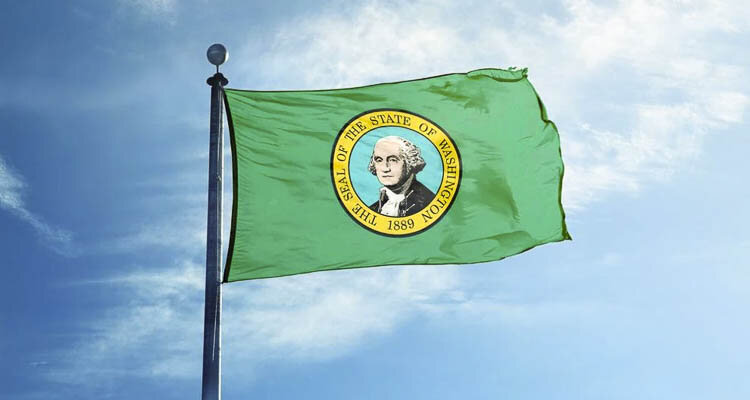
The Washington, D.C.-based think tank ranks the 50 U.S. states according to how their public policies affect individual freedoms in the economic, social and personal spheres
Brett Davis
The Center Square Washington
Washington comes in at No. 37 in the Cato Institute’s most recent “Freedom in the 50 States 2023” report.
In its study, the Washington, D.C.-based libertarian think tank ranks the 50 U.S. states according to how their public policies affect individual freedoms in the economic, social and personal spheres.
“The 2023 edition updates and expands on the six previous editions of Freedom in the 50 States,” the report’s introduction states. “It examines state and local government intervention across a wide range of policy categories – from taxation to debt, from eminent domain laws to occupational licensing, and from drug policy to educational choice.”
Washington’s No. 37 ranking puts it in the second-from-the-bottom category as organized in the report, from most free to least free: the five most free states at the top, followed by four groupings each of 10 states and the five least free states at the bottom.
“Washington is a stereotypical blue state that performs better on personal freedom than on economic freedom,” according to the report’s analysis of the Evergreen State. “Although Washington has had one of the more regulated economies in America for a long time, it has benefited from the fact that California and Oregon have had the same. Plus Washingtonians face a better fiscal policy environment than their left coast neighbors. However, it is a far cry from comparative regulatory heaven in neighboring Idaho.”
The report notes Washington “lacks an income tax; as a result, its fiscal policy is fairly good. Localities raise below the national average in taxes, 3.4 percent of adjusted income. State government, meanwhile, raises 5.9 percent of income, near the national historical average and a bit below the FY 2022 mean.”
While Washington does not have a state income tax, it has a capital gains tax.
In 2021, the state Legislature passed a capital gains tax and Gov. Jay Inslee signed it into law. It creates a 7% tax on profits of more than $250,000 from the sale of some assets, such as stocks and bonds.
In March, the state Supreme Court upheld the constitutionality of the tax.
The report dinged Washington on land use and labor-market freedom.
“Washingtonians enjoy little freedom to use their own land,” the study says. “Local and regional zoning and planning rules have become quite strict. Eminent domain abuse is almost unchecked.”
The report goes on to note, “It is one of the worst states on labor-market freedom. It lacks a right-to-work law, limits choices for workers’ compensation programs, and has extremely high minimum wages relative to its wage base.”
Washington’s minimum wage – $15.74 an hour – is already the highest state minimum wage in the country and is set to go up to $16.28 an hour next year.
The report gave Washington high marks for its criminal justice policies, calling them “among the best in the nation.”
“Incarceration and victimless crime arrest rates are far below national averages and fell substantially even before marijuana legalization,” the study notes. “They appear to have declined even more dramatically since 2019, perhaps due to changes in policing.”
Washington legalized medical marijuana in 1998 and recreational cannabis in 2012.
During a special legislative session in May, lawmakers passed a bill making intentional possession or public use of small amounts of illegal drugs a modified gross misdemeanor, punishable by up to six months in jail for the first two offenses and up to a year after that.
Inslee signed the bill into law less than two months before a temporary statute was set to expire that would have essentially decriminalized drug possession in Washington.
The new law came just as local governments were preparing to enact their own ordinances on drug possession, likely resulting in a confusing patchwork of laws throughout the state.
The five freest states according to Cato are:
1. New Hampshire
2. Florida
3. South Dakota
4. Nevada
5. Arizona
The five least free states according to Cato are:
50. New York
49. Hawaii
48. California
47. New Jersey
46. Oregon
This report was first published by The Center Square Washington.
Also read:
- House Democrats advance $18B in tax hike proposals as session winds downHouse Democrats in Washington advanced several tax hike proposals as the legislative session nears its end, aiming to address a major budget shortfall.
- Republican budget leaders see showdown ahead as Senate Democrats approve trio of major tax increasesSenate Democrats in Washington have approved major tax increases, prompting Republican budget leaders to warn of a growing showdown ahead.
- Representatives from the 18th and 20th Legislative Districts to hold joint town hall on May 3Lawmakers from the 18th and 20th Legislative Districts will host a joint town hall on May 3 at Battle Ground City Hall to review the legislative session and hear from residents.
- Expect delays on northbound I-5 near Ridgefield through May 9Northbound I-5 travelers near Ridgefield should expect delays through May 9 as crews work on improvements at the Exit 14 off-ramp to support future development.
- Brandon Erickson announces candidacy for Clark County Charter Review CommissionBrandon Erickson has announced his candidacy for the Clark County Charter Review Commission, seeking Position 1 in District 2.
- Clark County Sheriff’s Office investigating a reported burglary that led to apparent suicideThe Clark County Sheriff’s Office is investigating a reported burglary in Vancouver that ended with the apparent suicide of Charles Gardiner, interim chief of the Cowlitz Tribal Public Safety Department.
- POLL: Why did voters reject all three tax proposals in the April 22 special election?Clark County voters rejected all three tax measures on the April 22 special election ballot, prompting questions about trust, affordability, and communication.











